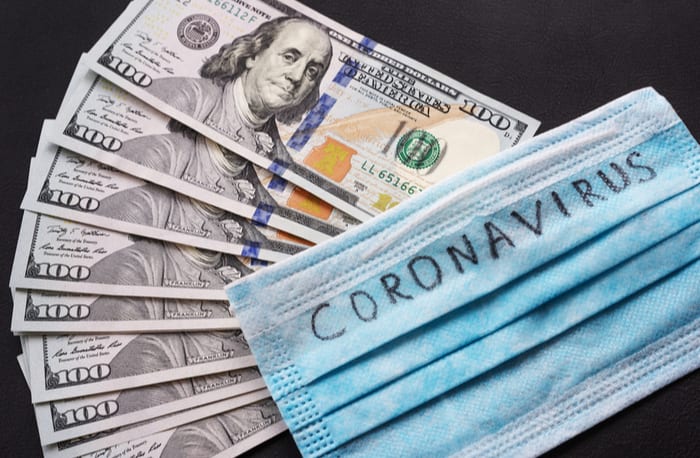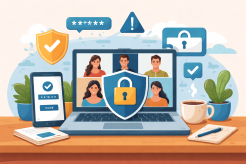Online Security: Coronavirus Internet Scams to look out for

While a lot of people are out of jobs, internet scams are rampaging and growing more than ever. A public service announcement has been issued by the FBI that there has been a rise in coronavirus-related fraud.
The pandemic and global crisis cause a lot of people to be stressed, hungry, and emotionally vulnerable and because of this they became an easy target for scammers. Those emotions are the target of scammers to steal your money and personal information using faulty websites, mobile apps, charities, and supply stores. Here are some details of the internet scams to look out for and what can you do to protect yourself.
1. Fake government emails
A common internet scam going on right now is a fake email claiming they come from CDC or World Health Organization. This email will tell you that they have new information that will help you regarding coronavirus and will urge you to click the given link or button. Another email internet scam that's been running around is a fake email claiming to come from a university, it usually claims that they have information about the school and online classes and all you have to do is click the link or button given. All these links and buttons from these types of emails contain malware that will be automatically downloaded on your computer and will result to your personal information getting stolen or lock your device and demand a payment to unlock it.
2. Suspicious source of information
Today there is a lot of wrong information out there. You have to look out for any malicious websites and apps that tell you to check the spread of COVID-19, especially if they ask for money or credit card information. These types of apps can plant a virus or ransomware on your device. This will lock your device and will render it unusable until you put your credit card information. You can check DomainTools for the list of apps that contain ransomware and SophosLabs for the list of COVID-19 related websites that will harm your computer.
3.Financial aid phishing
There's an email going around promising financial aid, airline ticket refunds, and business help. Remember that the government will not be giving out economic stimulus checks via an unsolicited email to your personal address. If you see an email asking for your banking information, social security number, or credit card information it is probably an internet scam.
4. Donation request
A lot of scammers are looking to take advantage of your humanity because during this crisis a lot of us are looking for ways to somehow help our fellowmen. There are a lot of fake charities and foundations set up to scam people. Be aware of the random emails from suspicious institutions that are asking for help money. Legitimate services and charities will not ask for donations using Bitcoin or gift cards however, scammers usually do because it is harder to track and there aren't a lot of measures to protect you.
5. Fake treatments, test, and supplies
There are emails, text messages, and robocalls telling you that they have coronavirus test kits, vaccines, and other prevention products. They are all fake and certainly not approve by the FDA.
Many people are rushing to prepare, there are shortages and panic-buying that inspired websites to sell face masks and sanitization products. According to BBB (Better Business Bureau) that there are a lot of fake online shops selling face masks. They will charge you for the product but it will never arrive or respond to you once you pay for it. Not only that they will never send you any product but they will have your credit card information.
What you should do if you got scammed
With all these modus looking legit there are times that even a professional will fall victim to it. When you do make sure to reset all and any relevant passwords and inform your bank or financial institution about it. You also need to make sure that you stop communicating with the person that scammed you. If you gave them money make sure to contact your bank or financial institution to cancel the card you used. After that, report it to either Equifax, TransUnion, or Experian, the three major credit reporting agencies. Also, you can report it to FTC or your Census Bureau.
Related Posts
 cheap internet deals
cheap internet offers
cheap internet plans
cheap internet deals
cheap internet offers
cheap internet plans
Unlimited Internet Plans in the US: What’s the Catch?
Are unlimited internet plans in the US truly unlimited? Learn about data caps, throttling, pricing, and how to choose the right plan.
 Technology
Technology
15 Intriguing Facts About the Internet You’ll Love
15 intriguing facts about the internet, from submarine cables to data usage trends and speed insights that impact your daily connection.
 Safety
Safety
Always Check the Website You Visit
Learn how to check if a website is safe before entering personal information. Protect yourself from scams, phishing, and malicious websites.
 Safety
Safety
How to Secure Video Calls and Prevent Hacks
Learn how to secure video calls, prevent meeting hacks, enable MFA, protect accounts, and safeguard remote meetings with practical security best practices.
 Internet Bundles
Technology
Internet Bundles
Technology
Is AT&T Customer Service Good? Support Review
Is AT&T customer service good? Explore support options, phone numbers, live chat access, and real performance insights for residential and business users.